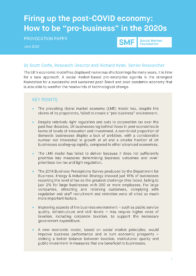The UK’s economic model has displayed numerous shortcomings for many years. It is time for a new approach. This briefing sets out why a social market-based pro-enterprise agenda is the strongest foundation for a successful and sustained post-Brexit and post-pandemic economy that is also able to weather the headwinds of technological change.
- The prevailing liberal market economy (LME) model has, despite the claims of its proponents, failed to create a “pro-business” environment.
- Despite relatively light regulation and cuts to corporation tax over the past four decades, UK businesses lag behind those in peer economies in terms of levels of innovation and investment. A non-trivial proportion of domestic businesses display a lack of ambition, with a considerable number not interested in growth at all and a smaller fraction of UK businesses scaling-up rapidly, compared to other advanced economies.
- The LME model has failed to deliver because it does not sufficiently prioritise key measures determining business outcomes and over-prioritises low tax and light regulation.
- The 2018 Business Perceptions Survey produced by the Department for Business, Energy & Industrial Strategy showed just 16% of businesses reporting the level of tax as the greatest challenge they faced, falling to just 2% for large businesses with 250 or more employees. For large companies, attracting and retaining customers, complying with regulation and staff recruitment and retention were all cited as much more important factors.
- Improving aspects of the business environment – such as public service quality, infrastructure and skill levels – may require higher rates of taxation, including corporate taxation, to support the necessary government expenditure.
- A new economic model, based on social market principles, would improve business performance and in turn economic prosperity – striking a better balance between taxation, institutional quality and public investment in measures that are beneficial to businesses.

Download The Report: PDF
